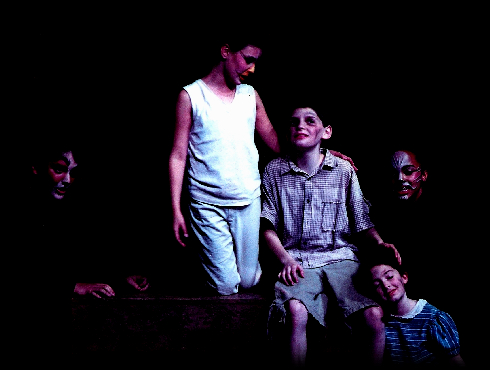
|
| Photo by Geoffrey W. Melada
|
Karen Saillant Bygott might have had an easier task directing an opera staple like Puccini’s “La Bohème” — or even the French comedy she had originally planned.
But back in February, when she heard about an upcoming performance of “Brundibar” taking place in New York City, the artistic director of Philadelphia Opera Theater decided that she, too, had to stage the Holocaust piece.
Bygott would have preferred at least six months to find and rehearse the cast — composed entirely of area children between the ages of 6 and 14 — but the Allen’s Lane Theater in Mount Airy was already booked for a May performance.
Hans Krasa’s dark, dissonant 1938 score tells the story of two Jewish children trying to raise money for their gravely ill mother. Needless to say, it doesn’t make for easy singing.
Originally written in Czechoslovakian, this version of the opera was primarily performed in English, with only one piece, a lullaby, sung in Czech.
While it’s difficult to imagine that children ever performed this work — its rapid, atonal passages would challenge even the most highly trained voices — “Brundibar” was staged more than 50 times in Theresienstadt by some of the 15,000 children who were imprisoned there before being sent to the gas chambers with their composer.
In the last few minutes of Philadelphia’s version of “Brundibar,” however, the young actors found some material that they could really understand.
And the result was magical — pure theater.
In an epilogue conceived by Bygott, each of the 39 children stepped forward, one at a time, and recited the name of an imprisoned child of the same gender and age who perished in the Holocaust.
“There’s a great deal of power in saying a name,” said the artistic director. Her theory proved sound during the May 4 performance; the audience of 200 people was breathless.
After the final curtain call, Jason Goodman,
a 14-year-old student at Bala Cynwyd Middle School who played the lead role of Little Joe, talked about that moment on stage.
“I felt like that person. I imagined myself as Hanus Hachenberg, and I thought about all of his family, how he would never see them again,” said Jason, one of two Jewish children in the production.
“I thought of how he had nothing to hold on to, how he was 14 and all alone,” said the teen.
“I learned to think about the victims of the Holocaust not as numbers, but as real people.”
That’s just what Bygott wanted to hear.
“One of the gifts of doing theater,” she explained, “is the ability to learn empathy.”